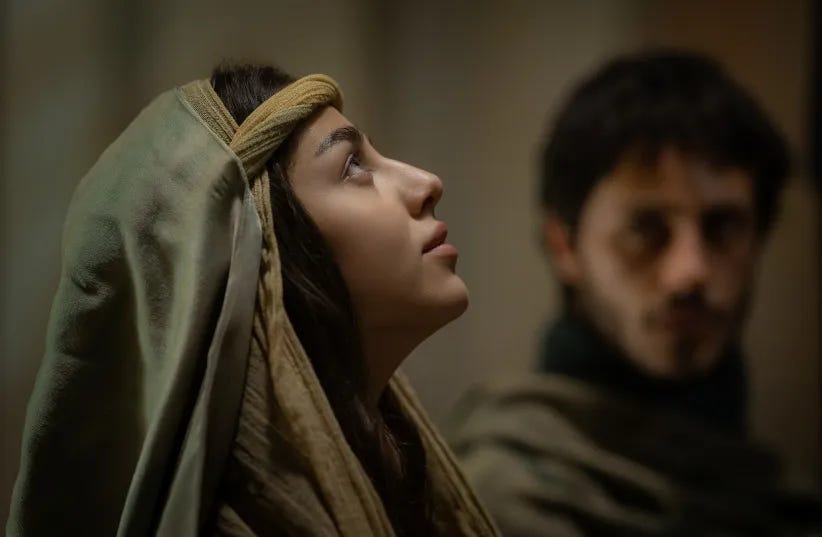Why You Should Avoid Netflix's 'Mary'
Netflix’s Latest Original Seeks to Make Mary "Special” and Misses What Actually Makes Her Special
Mary (2024), directed by D.J. Caruso and available to stream on Netflix, has been dropped on the world just in time for the Feast of the Immaculate Conception. And boy, does it completely miss the mark. Which is sad because it has a lot aesthetically going for it. I mean what else would you expect when megachurch, prosperity-gospel preacher, Joel Osteen is the executive producer and the project is his brain-child? Like the polished presentation of an Osteen service, this movie looks beautiful from its camera work, to its costumes, to its set-pieces, and even the good looks of its lead actors playing Mary (Noa Cohen) and Joseph (Ido Tako).
But from a filmmaking stand-point the rest of the film is uneven and doesn’t seem to know what genre it is in: is it a “survival thriller” (as producer Mary Aloe claims)? A historical epic? A historical romance? A Sunday school crash course on the Nativity story? You’ll feel the whiplash and tonal dissonance throughout. At least they didn’t burst into cringey Disney-pop songs like last year’s Journey to Bethlehem. But the spirit of this film still somehow feels the same: a quick cash grab by Netflix trying to capitalize on faith-based audiences this Christmas Season with a gauzy, melodramatic take on the life of Mary.
Despite these flaws, it wasn’t entirely boring. It’s actually pretty action-packed and engaging. One could appreciate the historical context the film seeks to give the life of Mary, especially in the first half, endorsing the tradition of St. Joachim and St. Anne being the parents of Mary for example (a fact found in tradition but not Scripture). But the film ultimately lacks true character work that makes it rewarding on repeat viewings and fundamentally invests its viewers more in the spectacle. One would think shows like The Chosen would have sparked a revolution by now in biblical story-telling where directors, screenwriters, and actors can flesh out the depth of the biblical characters more than just making them vessels for exposition dumping and the action of the plot. The Chosen does this well by going very granular on the psychological struggle of every character, including Jesus, through their individual experience of events in the New Testament. Mary shows its protagonists reacting to a lot of stuff, but they all still feel like shallow propaganda for making Christianity look “cool” or “edgy”.
What does this film get wrong on a historical and theological level?
This for me more than anything is what took me out of the film even as I was slipping in and out of being immersed in the suspension of disbelief.
For one thing, Mary is way too famous throughout the story. It’s almost as if every single character, villain or friend alike, fully understands that she is the fulfillment of Isaiah’s prophecy and that she is uniquely special. The biblical narrative of Luke and Matthew’s Gospels of course highlights the “buzz” around Jesus’ birth at that time (like the visit of the Magi or the vision of the Shepherds), but Mary is not a household name in Judea like the movie portrays her to be.
Mary’s miraculous motherhood was an incredibly subtle event that happened under the noses of the powers that be. Yet in Netflix’s Mary, she’s the talk of the town, mobs of zealots try to stone her for adultery like a scene straight out of John 8, King Herod (Anthony Hopkins) rants about the threat she poses to him after barely noticing her once, and the entire Temple system with all the priests, prophets, and girls offered to service there, seem to know she’s the Mother of the Messiah. Honestly, there’s something so telling that a “modern” movie about Mary succumbs to the instincts of the Instagram Age to be at the center of everyone’s attention as if Mary sought the spotlight and didn’t seek to be invisible and humble under the loving protection of St. Joseph whose marriage shielded her from public shame for the virginal Incarnation of the Son of God in her womb. Noa Cohen’s Mary is somehow trying to be a history changing-woman who actively desires significance and importance for herself but also is highly obedient and deferential at the same time. In essence, a bag of mixed signals. I just can’t see the woman Scripture reports as saying: “I am the handmaid of the LORD, let it be done to me according to thy will” being the same woman who wines to her superiors in the Temple, saying: “How can I do anything important if I’m stuck here?”
I could go on about how the story seems to contrive action at every corner. Take how the film went to the point of making St. Joseph into less of a firm, steady protector–a man of few words, and instead turned him into something closer to a supercharged Jason Bourne-style bodyguard fighting off multiple anachronistic attempts on Mary’s life.
Netflix’s Mary also doesn’t know how to stop taking liberties. Whereas other shows like The Chosen make concerted efforts to expand on the Biblical text in ways that harmonize with the text and enhance the overall context, the film just seems to insert shocking levels of invention into the plot to create drama like (SPOILER), a scene where soldiers kill St. Joachim (Mary’s father) in an attempt to get to Mary. It felt like an unearned, emotionally manipulative short-cut to give Mary’s character some kind of tragic origin where there wasn’t one.
A lot has been said about how this film undermines Catholic Mariology. Aside from Mary’s labor pangs that deny the reality of the Immaculate Conception’s cancellation of one of the main punishments for Original Sin, the movie mostly strays away from depicting Mary and Joseph as anything but devout Jews. However, the virtue of the heads of the Holy Family is fairly limited to generic acts of heroism and making sacrifices for each other out of love. It all feels so much like natural virtue and not supernatural virtue. For example, Joseph is shown to be protective and affectionate towards Mary, but after watching him strangle a would-be assailant to death and kick butt enough times, I began to wonder if this was closer to God’s “Just Man,” or King David’s “man of war” with “blood on his hands” (1 Chronicles 28:3).
The screenwriters definitely drew from the ancient (but apocryphal) Protoevangelium of James to form a lot of the plot for Mary’s early life in the temple dedicated to God. That apocryphal work is notable for being the first to mention Mary made a “perpetual vow of virginity” in the Temple (though the doctrine of Mary’s perpetual virginity undoubtedly predates the document). Essentially, it’s an early Christian fan-fiction that seems to try and account for why Mary asks Gabriel: “How can this be since I know not man?” The idea being that, to explain why Mary in the Bible didn’t automatically assume her husband would be the father of the messianic baby that Gabriel was talking about (and Gabriel’s words were pretty ambiguous about when Jesus would be born). She responds that she does not “know man,” full stop. Period. Ever. On principle. Her mind doesn’t seem to entertain that she and Joseph could have relations to fulfill this prophecy as soon as they move in under the same roof. That’s why it’s possible to infer that she has some kind of impediment to doing even that. According to the Protoevangelium of James, Mary ensures as a child that she will never have relations with any future man because she has been consecrated Samuel-style to service in the Temple by her parents. This sets up why Mary in the Gospels thinks the birth of Jesus is impossible morally (“How can this be…?” [Luke 1:34]) because to have relations with a man means she has to break a vow to God. But whether her vow comes from the Temple (as the Protoevangelium puts it) or merely a personal decision before her marriage to Joseph, it does somewhat explain why the angel says: “Nothing is impossible for God,” which is a curious statement to say to a married woman who has every normal intention of intercourse with her spouse, unless such words is an attempt to ease her qualms about keeping a vow of virginity and having a child at the same time. Yet this significance of the Temple service for Mary’s relationship with Joseph is completely lost on the evangelical creatives. The Temple story is now more of a prequel where Mary can have some kind of coming-of-age story and bask in the excitement of the prophetess Anna and the High Priest constantly reminding her of her importance in God’s prophecies. The scenes in the Temple also serve to ground the political tug-of-war between collaborators with Rome and Jewish “zealots” who sought to keep alive the Messianic hope of deliverance from oppression within the whispers of the Temple courts.
Ultimately, I prefer the real Nativity story where a humble man meets a humble woman whose humility merits her to be the Mother of God and the righteous actions of Joseph discreetly shield the mystery of Jesus’ heavenly origin from the prying eyes of the world until His time comes. Unless you're a poorly catechized Catholic, this film will likely not harm your faith, but will do something I consider worse: it won’t feed or enrich your faith. The movie has you praising Mary for virtues the Biblical text does not highlight when you could be meditating on how her holiness radiated from the smallest acts of faith, trust, and obedience. Stuff we can all relate to.
The greatest fault of this film? Making up and exaggerating stuff to make Mary “special” for a generation of people for whom faith is being the protagonist of your own story that God manifests for you, instead of being a player in a story much greater than you. The Nativity story is remarkable precisely because unremarkable-looking people are chosen by God out of relative obscurity to perform great but often hidden feats of virtue and undergo mostly unnoticed suffering. The carpenter, the virgin, the child. Their significance in God’s perspective will be known much later to the rest of civilization, but for now in the poverty of Nazareth, the halls of the Temple, or in the cold manger of Bethlehem, they will slip through their world like the ordinary people they appear as. Who pays them homage but a few pious shepherds and some precocious wise men? And the evil King Herod who gets a whiff of their presence is thwarted precisely because of the simplicity of his targets, being so out of reach and unknown to the halls of power. Thus, they evade his megalomaniacal slaughter of Bethlehem’s babies.
The REAL story of Mary is the triumph of humility and the God who “exalts the humble and casts down the mighty from their thrones” (Luke 1:52): you know, like the actual Mary said in her Magnificat in the Gospel of Luke.
However, I doubt that’s enough for our attention obsessed-generation and its superficial, flashy hagiographies that seem to think virtue isn’t a compelling enough subject matter to depict without a bunch of contrived drama, grim near-brushes with death that go far beyond the Biblical texts telling of events (which honestly are enough on their own), and having to make Mary into 1st century Palestine’s “it” girl.
Hard pass.






